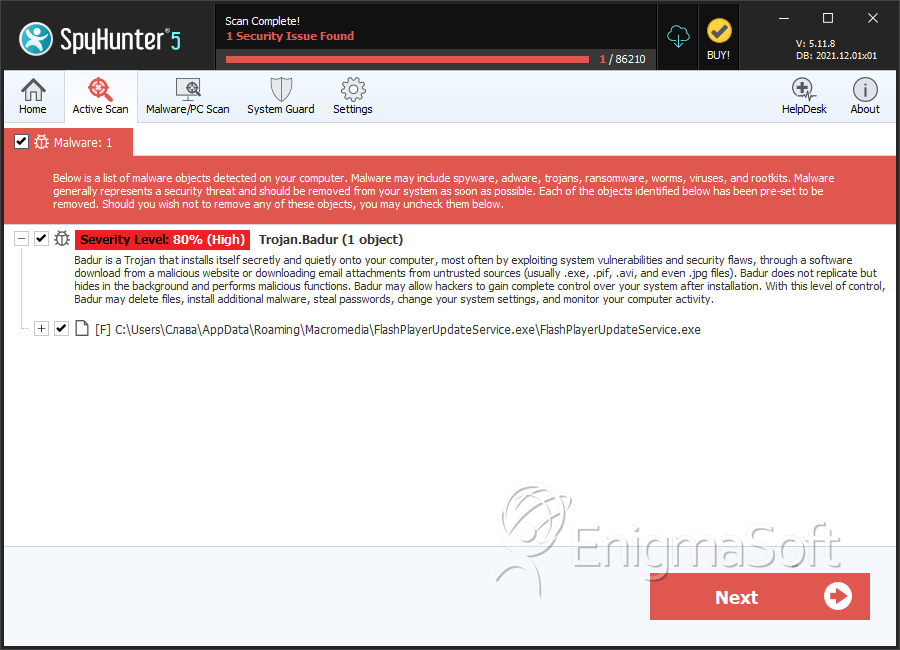Trojan.Badur
Threat Scorecard
EnigmaSoft Threat Scorecard
EnigmaSoft Threat Scorecards are assessment reports for different malware threats which have been collected and analyzed by our research team. EnigmaSoft Threat Scorecards evaluate and rank threats using several metrics including real-world and potential risk factors, trends, frequency, prevalence, and persistence. EnigmaSoft Threat Scorecards are updated regularly based on our research data and metrics and are useful for a wide range of computer users, from end users seeking solutions to remove malware from their systems to security experts analyzing threats.
EnigmaSoft Threat Scorecards display a variety of useful information, including:
Ranking: The ranking of a particular threat in EnigmaSoft’s Threat Database.
Severity Level: The determined severity level of an object, represented numerically, based on our risk modeling process and research, as explained in our Threat Assessment Criteria.
Infected Computers: The number of confirmed and suspected cases of a particular threat detected on infected computers as reported by SpyHunter.
See also Threat Assessment Criteria.
| Threat Level: | 80 % (High) |
| Infected Computers: | 294 |
| First Seen: | January 16, 2015 |
| Last Seen: | February 8, 2022 |
| OS(es) Affected: | Windows |
Reputable anti-virus products have generic detection names that may be used to describe malicious files that have not been identified as a particular threat – one of these names is 'Trojan.Badur.' This definition frequently refers to a PDF file that may hide more than meets the eye – cybercriminals are able to craft fake PDF documents that are meant to execute a malicious piece of code that may bring malware to your computer. Such PDF files may be distributed via various means – phishing emails, eBooks, pirated textbooks, etc. Be very careful with the files you download from the Web, especially if they do not come from a non-trustworthy source. Of course, it is also recommended to invest in a reputable anti-malware tool that will alert you in case it identifies any harmful traits in one of your files.
The detection rates for the Trojan.Badur have been on the rise recently because of a new spam campaign that takes advantage of the massive amount of news around the Coronavirus. The criminals disguise the PDF files as newsletters or documents regarding the outbreak and use social engineering tricks to get users to open the attachments. Needless to say, you should not download and open unknown files that were sent to you by anonymous emails.
SpyHunter Detects & Remove Trojan.Badur

File System Details
| # | File Name | MD5 |
Detections
Detections: The number of confirmed and suspected cases of a particular threat detected on
infected computers as reported by SpyHunter.
|
|---|---|---|---|
| 1. | FlashPlayerUpdateService.exe | fd0a12ff0915914635512ccf4b013550 | 132 |


Submit Comment
Please DO NOT use this comment system for support or billing questions. For SpyHunter technical support requests, please contact our technical support team directly by opening a customer support ticket via your SpyHunter. For billing issues, please refer to our "Billing Questions or Problems?" page. For general inquiries (complaints, legal, press, marketing, copyright), visit our "Inquiries and Feedback" page.